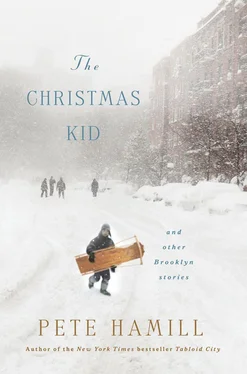Davis said, “Okay, we’ll pick you up Christmas Day, at eleven. Case closed.”
“No, wait a minute, I don’t want to—”
“You got no choice, Uncle Roy. We’re comin’ to get you.”
Davis started for the door, and the old man turned in the wheelchair, the cigarette burning between his fingers.
“I ain’t gettin’ dressed up,” he said. “Not for nothin’.”
“Okay with me.”
Davis was at the door now. The old man was silent.
“What do you really want for Christmas, Uncle Roy?”
The old man’s eyes blinked a few times, and he ran a hand on the hidden stump of a ruined leg.
“Nineteen forty-nine,” he said. “Nineteen forty-nine.”
HUGO BOARDED THE D train in Brooklyn one winter morning in 1951 and his life changed forever, although he didn’t know it at the time. He was squashed against the door of the conductor’s booth, reading a newspaper, when his eyes briefly wandered and came to rest on the face of a young woman. She was sitting facing him, reading a book called And Quiet Flows the Don . In his twenty-two winters on the earth, Hugo had never seen anyone quite like her.
“It wasn’t just her face,” he told me when I went to visit him many years later. “I mean, her face was amazing. Shaped like an oval, high cheekbones, clear skin, a great straight perfect nose… It was more than that. She had, like…like an aura .”
Possessed by the force of the aura, Hugo remained on the D train past his stop. He noticed that she had a portfolio of some kind beside her, and what seemed to be a toolbox on her lap; a model, he thought, or an artist. The aura pulsed with force, penetrating Hugo, and he suddenly knew, recklessly and intuitively, that this woman embodied everything he wanted: beauty, intelligence, warmth, humor, sensuality. He must have her. Not for a day or a week, but forever.
“She never noticed me looking at her,” he told me. “But finally she folded down a corner of the page in her book, looked around as we pulled into a station, picked up the portfolio and the toolbox, and got off. I followed her. The aura…”
He walked after her through the crisp winter morning. She turned onto 57th Street, and he noticed now that she had a perfectly proportioned body, good legs, a rhythmic, confident walk. He wanted to call her, touch her arm, ask for directions or a match. He did nothing. Without breaking stride, she hurried up the stairs of a large stone building and was gone. The Art Students League. His heart thumping, late for work, Hugo hurried back to the subway.
All that day, grinding away in the financial advertising agency on lower Broadway where he worked as a copywriter, Hugo brooded about the astonishing young woman. She dominated his night thoughts in the furnished room in Brooklyn, and the next morning he waited for the same D train, didn’t see the woman, let three more go by, and felt lost and disconnected when there was no sight of her. The same thing happened the next morning. The following day was a Friday; he told his boss he would be late, and went uptown and waited in front of the Art Students League. Dozens of young women entered the building, and a few young men, but he didn’t see the woman with the aura. At twenty past nine, he started back to the subway. And saw her hurrying around the corner, head bent into the winter wind.
“Miss?”
She looked up, blinking. “Yes?”
“I, uh, well, I wondered if, uh, well, if you’d like to have a cup of coffee with me sometime.”
She shook her head, an amused smile curling her mouth.
“Are you a lunatic or something?”
“No, no, I swear. I just…You were on the subway the other day, and you were reading that book And Quiet Flows the Don, and I…it’s hard to explain. Maybe I am a lunatic. I’d just like to have coffee with you, that’s all.”
That evening, they sat in a booth in a coffee shop on Broadway. She told him her name was Daria Stark, and her parents were from Russia, and she lived in Coney Island. Hugo told her about his life, his job, his time in the navy; he talked in great torrents about life and death and love. She listened to him in an enigmatic way, offering little comment, laughing out loud at some of his more extravagant flights, her amber eyes turning glassy when he fumbled for the Meaning of It All. Then it was time for her to go. Not home. To meet friends. In the Village.
“Can I go with you?”
“I don’t think that’s a good idea,” she said, and then, as if to ease the blow, added, “but—”
He rushed into the opening. Coffee again? She shrugged. Why not? Monday? Okay. Here? Sure. All the way home to Brooklyn, Hugo felt like singing. Daria Stark, he thought; my Russian. He went to the library, borrowed And Quiet Flows the Don, and spent the weekend in the Soviet Union, in heroic encounters with Whites and Reds, Cossacks and Separatists. He felt the aura of Daria Stark on every page. He heard her whisper the words to him: “Blinding and irresistible shines the feather grass along the steppe.…” He identified with the protagonist, Gregory Melekhov, as he groped from one incomplete collision with history to another; Daria would make him complete. They would forge a union based on intelligence, art, generosity, the heroic ideal.…
She didn’t show up on Monday. She wasn’t at the Art Students League, either. She wasn’t there that week or the following week or even after that. He looked for her in the subway, he called everyone named Stark in the Brooklyn phone book, he walked along Surf and Neptune Avenues, looking for her; he wandered the Village, haunted art galleries and museums, never seeing art, simply looking at faces. He never found Daria Stark.
Weeks passed, and then months, and finally years. Hugo left the advertising agency, went to work for a magazine, moved from Brooklyn to Manhattan. He dated other women, of course, and even entered into a few serious affairs. But each time he began to make that mysterious leap into total commitment, he would pass a coffee shop or come out of Carnegie Hall and look left to the Art Students League or hear a fragment of conversation about Russian novels or see a woman with a portfolio, and Daria Stark would force her way again into his consciousness, filling it completely with her enigmatic smile and her dark presence. He couldn’t ever explain this to the wounded and baffled women in his life; he couldn’t make clear the extraordinary moment of connection on the D train long ago; he couldn’t describe the…aura.
After a while, he stopped going out with women altogether. He became a Village character; his beard grew out, a rich brown at first, and then scratched with gray. His eyes, weakened by endless copywriting, were soon masked by thick glasses. He was a steady, controlled drinker, but every once in a while, on clear days in winter, he would sometimes drink too much. I met him on one such day in the Lion’s Head. His voice was choked, slurred, guttural. “She had the aura,” he said, trying to tell me the story. “Her name was Daria Stark and she had the aura.…”
At such times, he would get drunk for a few weeks, and lose his job, and then suddenly stop at the edge of the abyss, and go for a haircut, have his suit pressed, move to another magazine, and resume the routine of his life. He was often embarrassed after such binges, as if uncertain about how much he had revealed of himself while drunk. But most of the time he was just another one of those quiet wounded men who live out their lives in bars.
Then one humid summer afternoon, Hugo was sitting on a bench in Union Square Park. He tried to read a paper, but the day was too hot. He watched the junkies and winos for a while, and the pair of cops who moved through them like pedestrians feeding pigeons. Then he dozed, dreamy with summer exhaustion, and then was snapped awake by the backfiring of a truck.
Читать дальше












